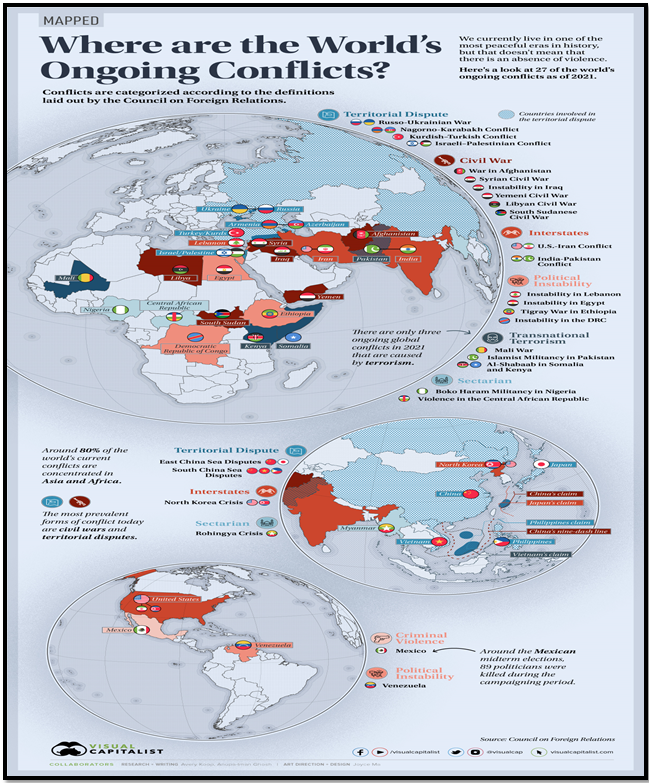NAVIGATING THE CHALLENGES OF 2024
Syllabus:
GS 2 :
- India and its Neighborhood- Relations.
- Effect of Policies & Politics of Countries on India’s Interests.
Focus:
- The commencement of 2024 brings forth a sense of apprehension, both on the domestic and international fronts, as various geopolitical and internal challenges loom large.
- This analysis seeks to dissect the multifaceted issues that are likely to shape the trajectory of the year ahead, delving into geopolitical tensions, regional dynamics, and internal concerns.
Geopolitical Landscape:
The Ukraine Conflict:
- Despite the current stalemate, the Ukraine conflict remains a powder keg, with the potential to escalate into a more perilous phase.
- Both sides’ reluctance to engage in peace talks raises concerns of further escalation, possibly involving the use of lethal weaponry, including nuclear arms.
Unrest in West Asia:
- The resurgence of the Israel-Hamas conflict and escalating tensions between Iran and Pakistan exacerbate instability in West Asia.
- Iran’s belligerent stance, coupled with its encouragement of Houthi attacks on US and foreign ships, underscores the region’s volatility, with ramifications extending beyond its borders.
Indo-Pacific Dynamics:
- Recent developments in the Indo-Pacific, particularly the elections in Taiwan, have heightened tensions in the region.
- The anti-China stance of Taiwan’s new leadership, led by Lai Ching-te, risks provoking China and escalating territorial disputes with neighboring countries like the Philippines, potentially drawing the US into the fray.
India’s External and Internal Dynamics:
India-China Relations:
- Border tensions between India and China persist, necessitating heightened vigilance, especially in light of China’s economic challenges.
- India’s strategic partnerships and diplomatic initiatives will be crucial in managing bilateral relations and safeguarding its territorial integrity.
Neighbourhood Diplomacy:
- India’s relations with its neighbours, particularly Bhutan, require strategic
Source: Visual Capitalist
attention amidst China’s aggressive overtures.
- Strengthening ties and fostering cooperation with neighbouring countries will bolster India’s regional influence and counter China’s expansionist agenda.
Internal Challenges:
- Domestically, India grapples with a myriad of challenges, including communal tensions exacerbated by religious fervour ahead of the upcoming elections.
- Ensuring social cohesion and upholding democratic principles will be paramount in navigating internal discord and fostering national unity.
Security Concerns:
Northeast Challenges:
- The Northeast region continues to face security challenges, with states like Manipur, Mizoram, Nagaland, and Assam witnessing sporadic incidents of unrest.
- Addressing long standing grievances and promoting inclusive development are essential to maintaining peace and stability in the region.
Left-Wing Extremism:
- While left-wing extremist activities have decreased in recent years, pockets of insurgency remain active in certain mainland states.
- Strengthening intelligence gathering and enhancing security measures are imperative to combatting the threat posed by extremist groups.
Parliamentary Functioning:
- The efficacy of India’s parliamentary system has come under scrutiny following the events of 2023, highlighting the need for institutional reforms and proactive governance.
- Upholding parliamentary norms and fostering bipartisan cooperation are essential to ensuring effective legislative functioning and upholding democratic principles.
Parliament’s Role:
Ensuring Effective Governance:
- Parliamentary leaders must prioritize consensus-building and constructive dialogue to address the nation’s most pressing challenges.
- Upholding the principles of transparency, accountability, and inclusivity is paramount in ensuring effective governance and democratic resilience.
A Year of Reckoning:
- The year 2024 presents a critical juncture for India’s parliamentary democracy, with challenges to its functionality and credibility.
- Parliament must play a proactive role in addressing pressing national issues and safeguarding constitutional liberties.
Way Forward / What India needs to do?
- Strategic Diplomacy and Engagement:
- Prioritize diplomatic engagement with key stakeholders, including China, to mitigate border tensions and foster regional stability.
- Strengthen alliances with like-minded nations in the Indo-Pacific region to counterbalance China’s assertive behaviour and safeguard maritime security.
- Leverage multilateral forums such as ASEAN and QUAD to promote dialogue and cooperation on regional security issues.
- Neighbourhood Outreach and Cooperation:
- Enhance diplomatic ties with neighbouring countries, particularly Bhutan, through economic assistance and strategic partnerships.
- Foster people-to-people exchanges and cultural diplomacy to build trust and goodwill among regional neighbours.
- Collaborate with regional organizations such as SAARC to address common challenges and promote regional integration.
- Internal Security Measures:
- Strengthen intelligence gathering and surveillance capabilities to combat insurgency and extremist activities in North-eastern states.
- Invest in socio-economic development projects and infrastructure initiatives to address underlying grievances and promote peacebuilding.
- Collaborate with state governments and local communities to implement targeted counter-insurgency strategies and enhance law enforcement efforts.
- Parliamentary Reform and Institutional Strengthening:
- Institute parliamentary reforms to streamline legislative processes and improve governance efficiency.
- Enhance transparency and accountability mechanisms within Parliament to foster public trust and confidence in democratic institutions.
- Promote cross-party dialogue and consensus-building to address national issues and promote bipartisan cooperation.
- Promotion of Democratic Values and Civic Engagement:
- Encourage civic participation and grassroots activism to promote democratic values and civic engagement among citizens.
- Invest in civic education programs and public awareness campaigns to enhance public understanding of democratic principles and rights.
- Foster a culture of tolerance, inclusivity, and respect for diversity to strengthen social cohesion and national unity.
As India navigates the challenges of 2024, strategic foresight, diplomatic acumen, and proactive governance will be essential in addressing geopolitical tensions, managing internal discord, and fostering regional stability. By prioritizing national interests and upholding democratic values, India can overcome its myriad challenges and emerge stronger on the global stage.
Source:
Mains Practice Question:
Evaluate the role of India amidst ongoing global conflicts in regions such as West Asia, Eastern Europe, and the Indo-Pacific. Assess the implications of India’s engagement in shaping regional and global security dynamics.

 Source: Visual Capitalist
Source: Visual Capitalist

